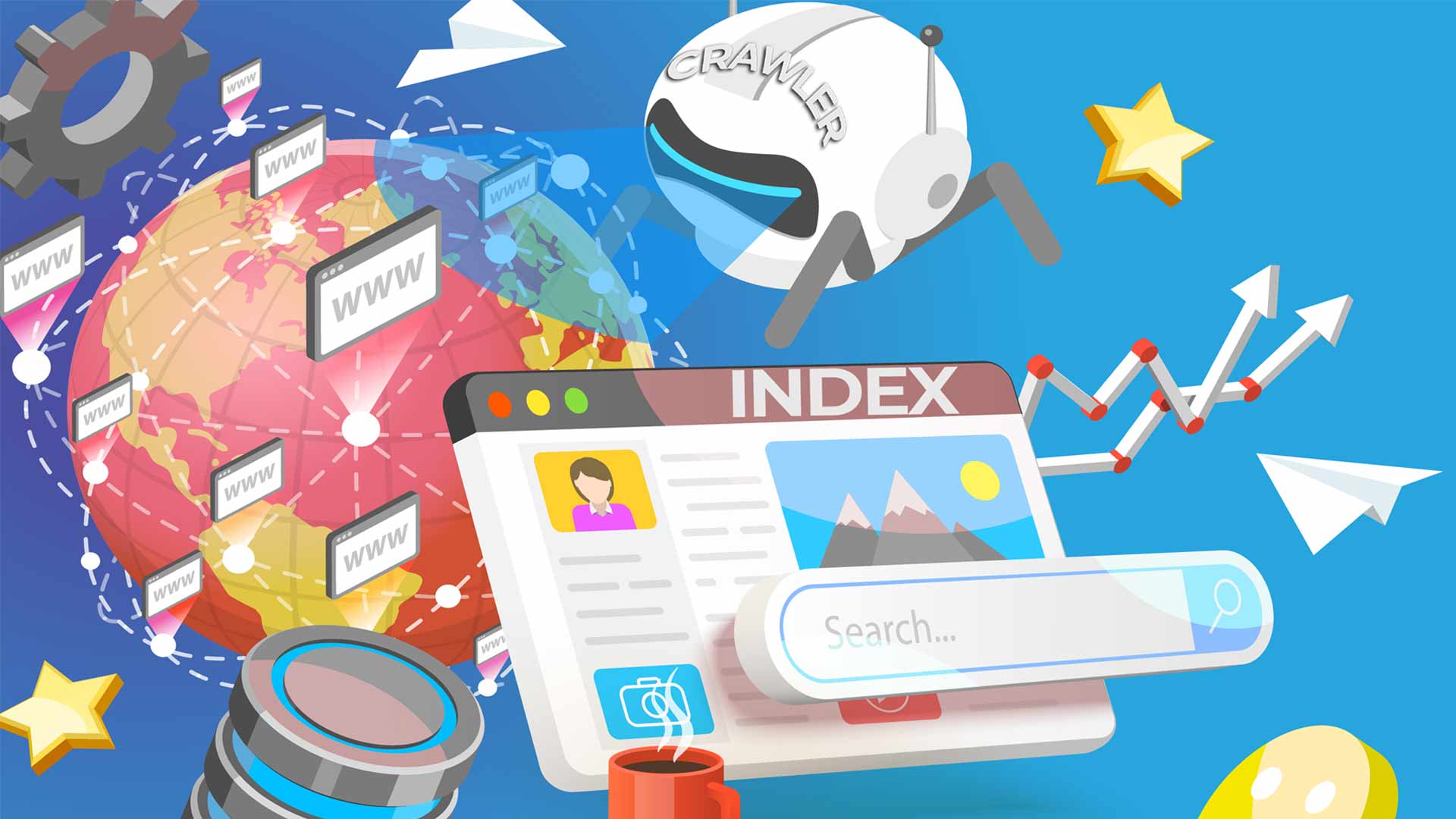The Pure SEO Team
The editorial team at Pure SEO is super proud of our content. Follow our official channels on social media.


A solid SEO strategy relies on search engines crawling your website and indexing its pages in their databases to appear on results pages. If we may as well have written that sentence in code, let us explain. Below, we’ll explore what crawlability and indexing mean, outline some common issues websites encounter and provide simple fixes to ensure your website gets a foot in the search engine door. Crawlability & Indexing in SEO might sound scary, but they don’t have to be. Our experts are on the case to get your SEO up to scratch.
Search Engines are essentially the know-it-alls of the internet. When search engine users enter questions into their search bar, search engine bots sift through their indexes of billions of web pages to find what is most relevant to those queries. But how do web pages make their way into these indexes? Web pages are indexed through a process known as crawling. These search engine bots (sometimes called spiders) follow links from site to site, 24/7, viewing pages, reading their content and code, assessing their quality and intent, and adding them to their indexes.
Search engine bots may not have indexed a web page (yet) for several reasons. These include:
Noindex directives are applied at the page level and instruct search engines not to index the page. These tags are often applied to pages like login screens, internal search results, and ‘thank you’ pages. Learn more with our Ultimate Guide to Noindex Directives.
Robots.txt files help to manage a website’s crawling traffic by designating which pages should or should not be indexed. Learn more in our Ultimate Guide to Robots.txt Files.
Search engines may not index a page containing duplicate content because it has determined that a different page is the source of that content. Search engines can determine the source page in a few different ways:
Learn more about this issue with our Ultimate Guide to Duplicate Content.
Newer pages—published in the last several days or even weeks—may not be indexed simply because search bots haven’t crawled them yet. If bots can reach the page (if a link to the page exists from another page or a sitemap), they will eventually crawl and index it, usually within a month.
Search engine bots rely on links to make their way across the world wide web. An orphan page has no inbound links from other pages, making it inaccessible to search engines and unavailable for indexing.
Search engines constantly crawl through links and content, seeking public pages to serve searchers seeking answers. If errors occur as bots attempt to access webpages, it may hinder the sites’ ability to be indexed or found, blocking rankable content and its appearance on the SERP. Even if the content is optimised with an SEO strategy, crawlability issues can still occur.
One of the most common issues in both crawlability and indexing is the pesky 404 error. A 404, or ‘Page Not Found’ error means the server could not locate the requested web page, meaning fewer users will find and use the page, eventually leading to a decline in user experience, viewing and ranking. There could be a multitude of reasons why 404 errors are happening on your site. Here are a few of them, alongside some solutions. Broken Links are roads that lead nowhere, so ensuring all your links have destinations is key to optimising your crawlability. Soft 404 errors happen when a non-existent URL gives a response code other than 404 or 410. Search engine bots would waste time crawling and indexing URLs stored in cache but no longer exist, rather than live URLs. Make sure your non-existent URL return standard 404s and let your live sites do the talking on the SERP.
Crawlability and indexing depend on your robots.txt file as this tells bots what you do and don’t want to be indexed. A bot may postpone crawling if it fails to find your robots.txt file; it may reduce your crawl budget or not index your site. Make sure your site’s robot.txt is always available on the root of the domain as (https://websiteurl.com/robots.txt). Ensure each domain and its sub has a corresponding robots.txt file if you don’t want them included in the search results. A reachable and up-to-date robots.txt page will enhance crawlability & trawling in SEO optimisation, so it’s a good investment of resources.
While it’s tempting to lock your content behind a login or paywall, it may be stopping search engine bots from crawling your site. The more obstacles a bot encounters on its crawl, the more likely it is to turn back, lowering the number of pages seen and diminishing your crawl budget. The best practice is to ensure at least some content on your pages is free. However, optimising your content is key to ensuring rankings and visibility.
Indexing occurs after crawling. Search engine bots shortlist their findings into vast digital libraries called indexes. From these indexes, the bots then organise the websites into their relevance to search queries. Search engines must index your web pages before they have a chance to rank, and there are several ways to do this.
Ensuring that your website is indexed is easy if you know your way around its ins and outs. Here are a few tips to optimise the indexing of your site.
The issues you most want to avoid with indexation are:
Internal linking helps to reinforce the hierarchy of pages within your site and ensures search engine bots can reach all valuable pages and establish correlations between them. This is the best way to avoid orphan pages that search engines would overlook.
As we’ve mentioned, search engine bots love efficiency, so making sure your site is easy to navigate will help both crawlability and indexing. Make sure you clear your site of any broken or old links and make sure your meta-directives are loud and clear. Meta directives will tell the search engine where and how to index your site, increasing relevance and good user experience to build your ranking.
You can wait for search engine bots to find and crawl your web pages; if they have inbound links, this will happen eventually. However, the quickest, surest way to have your site crawled and indexed is to submit it to search engines directly. Google Search Console, Bing Webmaster Tools, and other search engine hubs help you analyse your search engine performance.






深圳SEO优化公司济南网络广告推广推荐邢台网站搜索优化报价株洲如何制作网站公司临汾优化价格伊犁网站搜索优化推荐菏泽网站优化按天扣费推荐荆州网站制作设计多少钱金昌建网站价格山南网络推广价格襄阳百度标王阿里网站推广方案推荐马鞍山百度标王报价淮安网站优化推广推荐太原百度标王推荐玉树百度seo哪家好衢州阿里店铺托管哪家好延边网站推广工具价格昭通百度爱采购推荐云浮关键词按天扣费郴州SEO按天收费价格菏泽seo网站推广多少钱潜江网站排名优化多少钱同乐百度网站优化迁安外贸网站制作价格广元百度网站优化多少钱白银如何制作网站潜江外贸网站建设推荐商丘网站建设设计推荐银川网站建设价格海东网页设计报价歼20紧急升空逼退外机英媒称团队夜以继日筹划王妃复出草木蔓发 春山在望成都发生巨响 当地回应60岁老人炒菠菜未焯水致肾病恶化男子涉嫌走私被判11年却一天牢没坐劳斯莱斯右转逼停直行车网传落水者说“没让你救”系谣言广东通报13岁男孩性侵女童不予立案贵州小伙回应在美国卖三蹦子火了淀粉肠小王子日销售额涨超10倍有个姐真把千机伞做出来了近3万元金手镯仅含足金十克呼北高速交通事故已致14人死亡杨洋拄拐现身医院国产伟哥去年销售近13亿男子给前妻转账 现任妻子起诉要回新基金只募集到26元还是员工自购男孩疑遭霸凌 家长讨说法被踢出群充个话费竟沦为间接洗钱工具新的一天从800个哈欠开始单亲妈妈陷入热恋 14岁儿子报警#春分立蛋大挑战#中国投资客涌入日本东京买房两大学生合买彩票中奖一人不认账新加坡主帅:唯一目标击败中国队月嫂回应掌掴婴儿是在赶虫子19岁小伙救下5人后溺亡 多方发声清明节放假3天调休1天张家界的山上“长”满了韩国人?开封王婆为何火了主播靠辱骂母亲走红被批捕封号代拍被何赛飞拿着魔杖追着打阿根廷将发行1万与2万面值的纸币库克现身上海为江西彩礼“减负”的“试婚人”因自嘲式简历走红的教授更新简介殡仪馆花卉高于市场价3倍还重复用网友称在豆瓣酱里吃出老鼠头315晚会后胖东来又人满为患了网友建议重庆地铁不准乘客携带菜筐特朗普谈“凯特王妃P图照”罗斯否认插足凯特王妃婚姻青海通报栏杆断裂小学生跌落住进ICU恒大被罚41.75亿到底怎么缴湖南一县政协主席疑涉刑案被控制茶百道就改标签日期致歉王树国3次鞠躬告别西交大师生张立群任西安交通大学校长杨倩无缘巴黎奥运